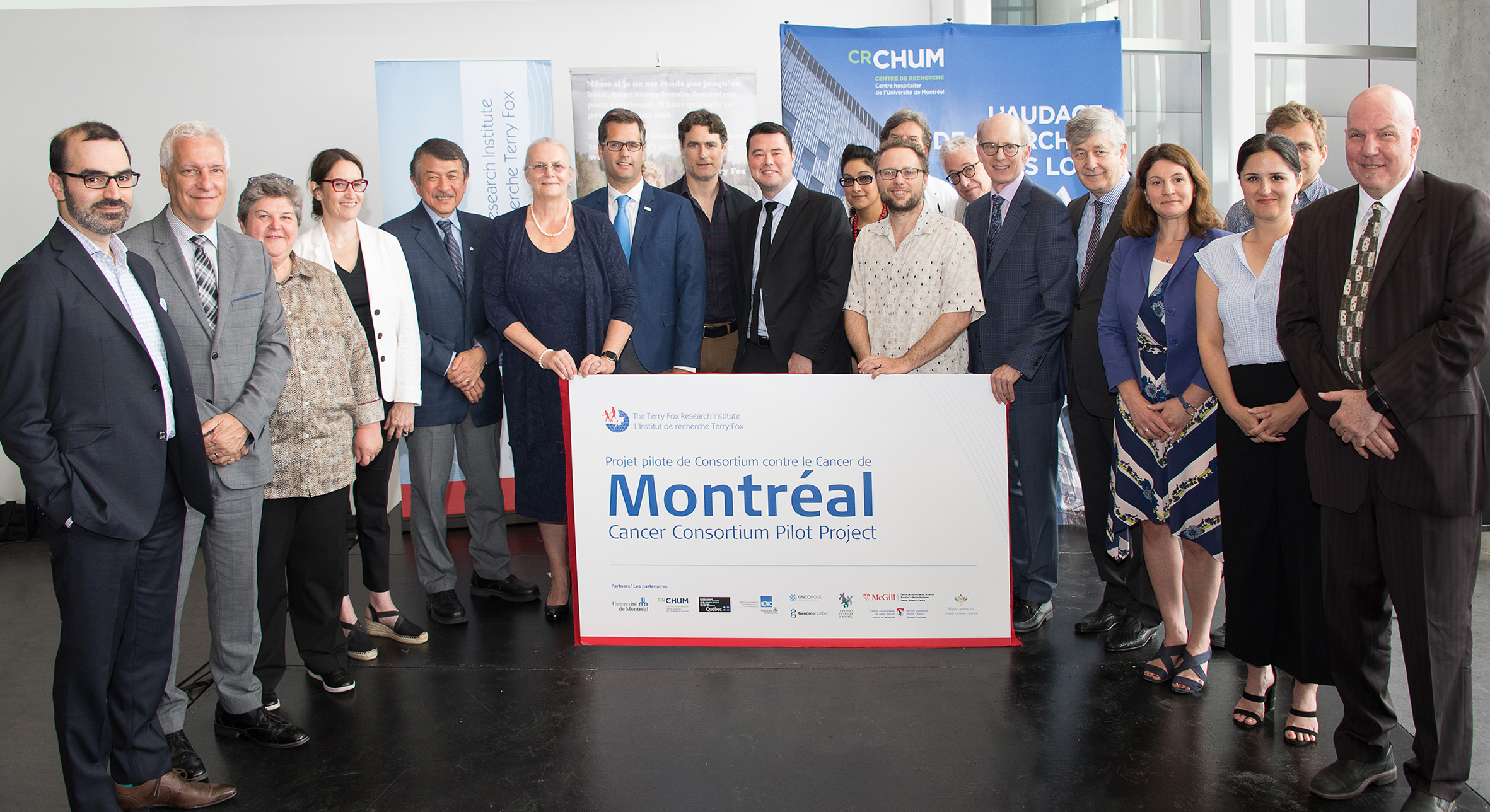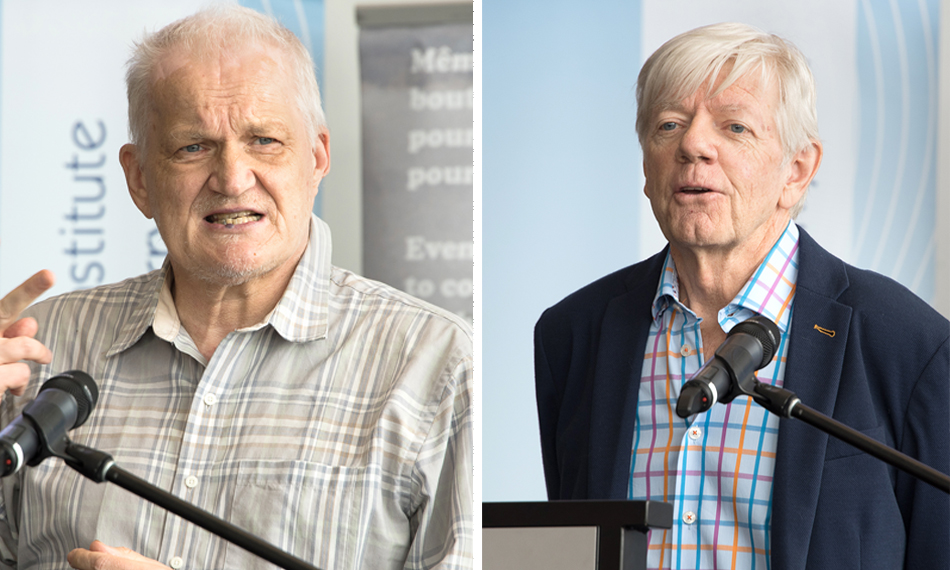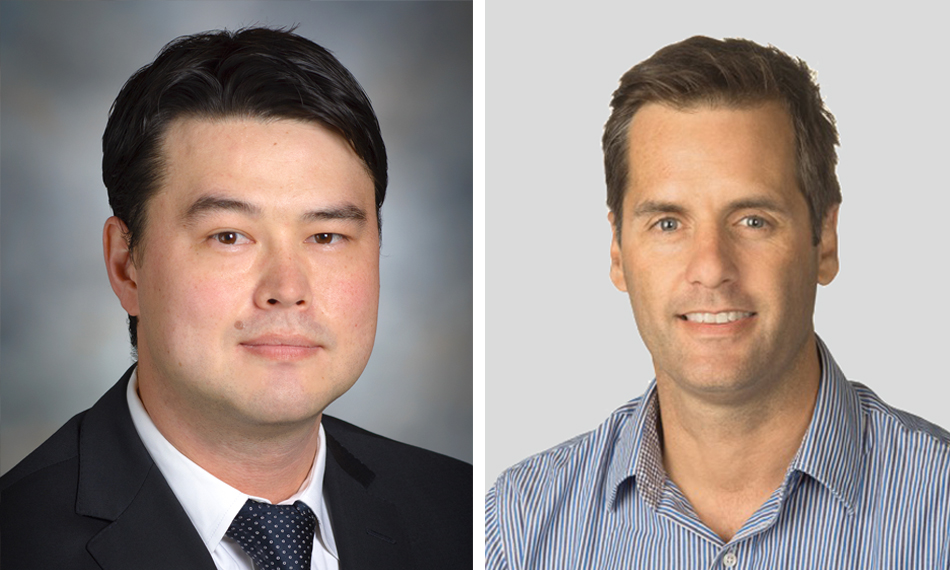 Representatives from partnering institutions participate in the unveiling of the Montreal Cancer Consortium Pilot Project.
Representatives from partnering institutions participate in the unveiling of the Montreal Cancer Consortium Pilot Project.
Thursday, June 28, 2018
(Click here for French version)
MONTRÉAL - Seeking to improve treatments for 18,000 annual cancer patients, leading researchers, cancer centres and hospitals in Montreal and The Terry Fox Research Institute have partnered to generate new advances in personalized and precision medicine.
The multi-institutional Montreal Cancer Consortium (MCC) comprises the Centre de recherche du Centre hospitalier de l'Université de Montréal (CRCHUM), Goodman Cancer Research Centre (GCRC), Centre de Recherche Hôpital Maisonneuve-Rosemont, Institute for Research in Immunology and Cancer (IRIC), Jewish General Hospital (JGH), McGill University, the Université de Montréal, Génome Québec Innovation Centre, and the Research Institute of the McGill University Health Centre (RI-MUHC).
For the Terry Fox Research Institute, the launch of this consortium marks another step forward in accelerating precision medicine for all Canadians. The consortium is the second pilot project the Institute has created as part of its strategy to form a pan-Canadian network of linked cancer centres from coast to coast.
The Montreal pilot project members will further develop a new cancer treatment strategy that enhances an individual’s immune system to fight cancer called immunotherapy, which has recently shown impressive results for some patients.
A small dark spot on his lower leg that Yves Tellier, 70, thought was an injury from a golf club turned out to be Stage IV melanoma. That was six years ago and when metastatic disease was found on his spine in 2013, he was treated with immunotherapy and chemotherapy at the Centre hospitalier de l'Université de Montréal. His health improved dramatically. “I am currently in complete remission with very few side effects. I now have a normal, active life. I can ski, golf, cycle and scuba dive. Had it not been for this treatment, I am convinced I would not be alive today. Thanks to this new consortium, instead of working on their own, the amalgamation of these researchers will help advance cancer treatments, and that is great news for patients.
Immunotherapy changed Stan Czebruk’s life. “It was in 2009. I was hiking in Scotland, when my wife called me and announced that I had cancer. It was a melanoma on my left ear that spread later to my lungs and brain,” explains the 60-year-old Montrealer, who is treated at the McGill University Health Centre. He, too, is now in remission and will undergo his last immunotherapy treatment at the beginning of August. “It has been a long journey, but I have a lot of faith in the health care system and great hope that more research will be done and more treatments will be found.

Stage IV melanoma patients Stan Czebruk and Yves Tellier speak at the launch of Montreal Cancer Consortium.
The Montreal Cancer Consortium will focus on immunotherapy treatments for melanoma and acute leukemia initially and use the knowledge and resources gained to support other cancer types. “We have both leadership in this research area in Montreal and also an unmet clinical need for new treatments to be developed so that more patients treated with this therapy have better outcomes. Currently only 20-30 per cent of patients who receive immunotherapy respond well to the treatment,” remarks pilot project co-principal investigator Dr. John Stagg, CRCHUM researcher and associate professor, Faculty of Pharmacy, Université de Montréal.
Working together, the MCC researchers will also aim to better understand how various aspects of the immune system relate to acute leukemia and why therapy works for some patients but not others. They hope to identify new biomarkers and novel targets that will respond to immunotherapy treatments.
“In total, the Montreal Cancer Consortium will harness the data power of more than 18,000 patients annually and more than 50 ongoing precision medicine and immunotherapy clinical trials, with the goal of developing one of the most patient-centric oncology innovation poles in Canada,” says Dr. Ian Watson, Canada Research Chair in Functional Genomics of Melanoma and assistant professor, Department of Biochemistry at McGil, member of the Goodman Cancer Research Centre, and co-principal investigator for the MCC project.

Drs. Ian Watson (GCRC) and John Stagg (CRCHUN) will be co-principal investigators for the new pilot project.
The MCC will receive $6.5 million over the next two years from several organizations supporting the initiative. As the project catalyst, TFRI is providing $2 million and Oncopole, Genome Québec, Goodman Cancer Research Centre and Institut du Cancer de Montréal are among several other co-funders.
“We are delighted to see the formation of this partnership with Montreal’s leading health and academic cancer centres, researchers and clinicians. In consolidating their work, and forging these new collaborations, we are creating a new working paradigm that has the potential to make a real difference in the clinic and that is great news for patients living here in Quebec and anywhere in Canada,” says Dr. Victor Ling, TFRI’s president and scientific director.
“This partnership is the outcome of an important mobilization effort across different Montreal hospitals and research centers involved in the fight against cancer. We are proud to contribute $750,000 to the consortium creation that responds to the co-ordination needed to bring innovative solutions to patients,” explains Stéphanie Lord-Fontaine, executive director of Oncopole.
“Génome Québec salutes this initiative of the Terry Fox Research Institute that aims to bring together cancer research organizations and experts, and Montréal’s health institutions. We are proud to participate, as a partner, in supporting genome studies in the projects involved. The Montreal Cancer Consortium (MCC) promotes clinical integration of genomic data and the implementation of precision medicine. We are convinced that the MCC will help make Montréal a competitive, ideal and sustainable environment for cancer research, for the greater good of patients,” says Daniel Coderre, president and CEO of Génome Québec.
Partner Institutions

About The Terry Fox Research Institute (TFRI)
Launched in October 2007, The Terry Fox Research Institute is the brainchild of The Terry Fox Foundation and today functions as its research arm. TFRI seeks to improve significantly the outcomes of cancer research for the patient through a highly collaborative, team-oriented, milestone-based approach to research that will enable discoveries to translate quickly into practical solutions for cancer patients worldwide. TFRI collaborates with more than 80 cancer hospitals and research organizations across Canada. TFRI headquarters are in Vancouver, B.C. For more information please visit www.tfri.ca and follow us on Twitter (@tfri_research).
About Centre de recherche du Centre hospitalier de l'Université de Montréal (CHUM)
The Centre de recherche du Centre hospitalier de l'Université de Montréal is one of North America’s leading hospital research centres. It strives to improve adult health through a research continuum covering such disciplines as the fundamental sciences, clinical research and public health. Over 1,819 people work at CRCHUM, including 465 scientists and 641 students and research assistants chumontreal.qc.ca/crchum
About the Goodman Cancer Research Centre (GCRC)
The Rosalind and Morris Goodman Cancer Research Centre (GCRC), located within McGill University’s Life Sciences Complex, is a state-of-the-art hub for ground-breaking cancer research that attracts and retains top scientists from around the world. Originally established in 1978 as the McGill Cancer Centre, the GCRC leads scientific advances that enable it to investigate cancer at a genomic, cellular and molecular level, and to understand how cancer progresses, spreads and resists therapies. The GCRC currently comprises 27 dedicated research teams with cutting-edge technology platforms, research and support staff and over 200 trainees. Research activities at the GCRC represent a first line of defense in the fight against cancer, with focus on fundamental research to understand why cancers fail to respond to treatment and translating findings into new targets and therapies.
Media Contacts
For more information, please contact:
Jason Clement, McGill University,
514-865-6990 (cell);
Jason.clement@mcgill.ca
Julie Cordeau-Gazaille, Université de Montréal,
514-343-6796;
j.cordeau-gazaille@umontreal.ca
Kelly Curwin, TFRI,
cell: 778-237-8158;
kcurwin@tfri.ca
To interview Mr. Stan Czebruk, please contact:
Julie Robert, MUHC
514-971-4747;
julie.robert@muhc.mcgill.ca
To interview Mr. Yves Tellier, please contact:
Jacinthe Ouellette, CHUM/ CRCHUM
514-246-0567 (cell.);
jacinthe.ouellette.chum@ssss.gouv.qc.ca